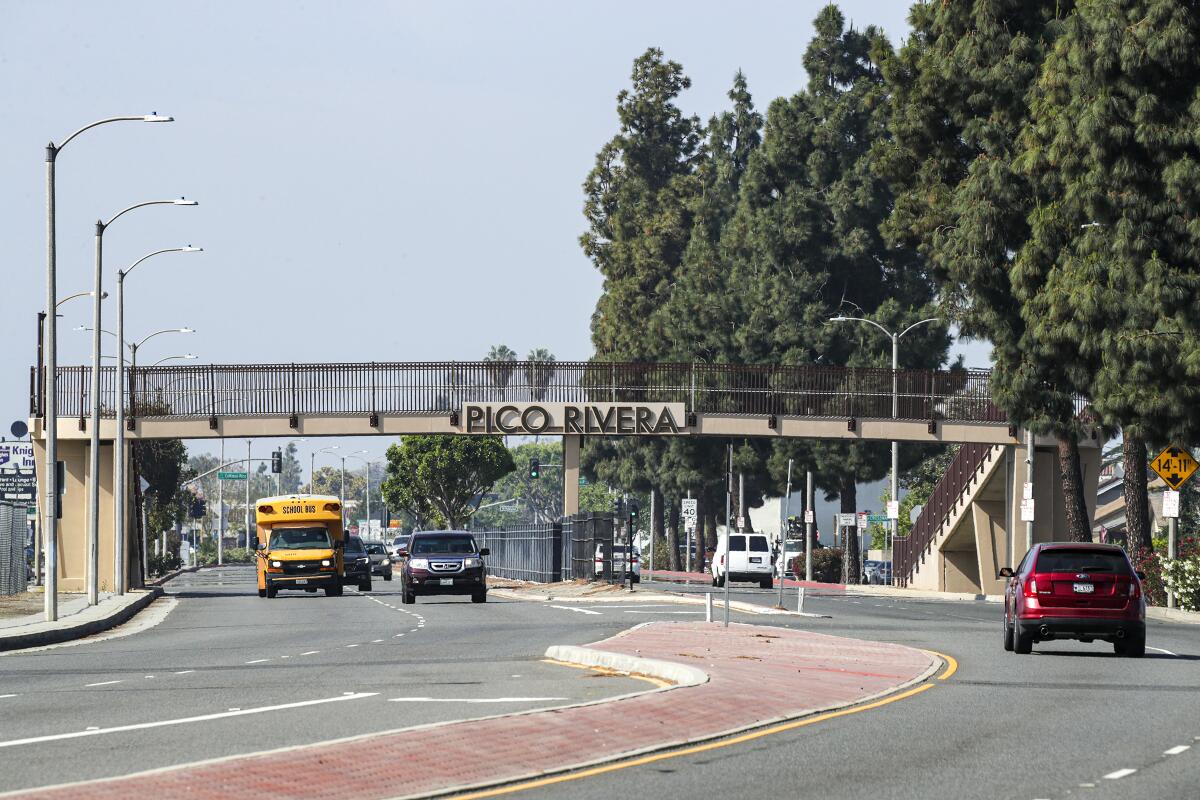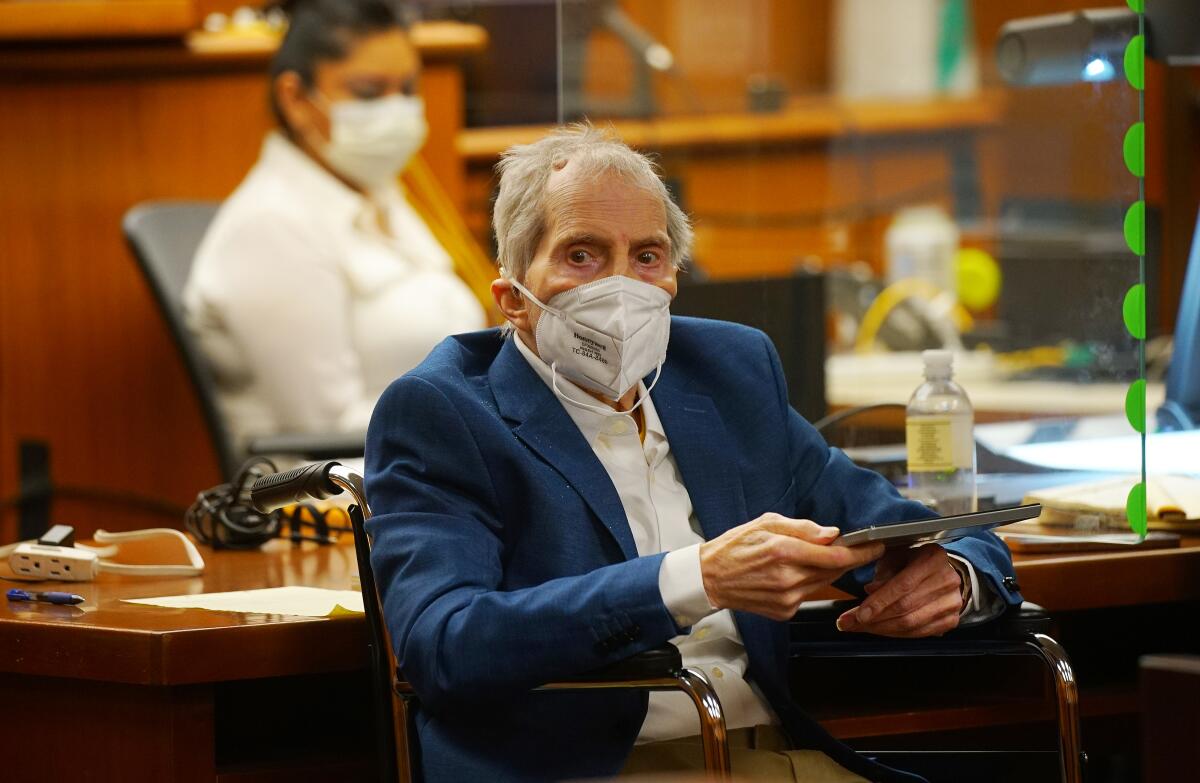Essential California: The grief that follows

- Share via
Good morning, and welcome to the Essential California newsletter. It’s Wednesday, May 19. I’m Melissa Gomez, and I’m writing from Los Angeles.
The mood across the state has diverged from where we were a year ago.
After a long period of lockdowns and safety protocols, Orange County this week progressed to the state’s least restrictive tier of reopening, joining Los Angeles and several other counties in that distinction.
Schools are becoming vaccination sites for younger children. The Los Angeles Unified School District, the second-largest district in the country, is offering cash, prizes and other incentives to urge students ages 12 and up to get vaccinated.
But the hard reality is that there is still trauma being felt in school communities, even as optimism abounds. While many school districts have raced to reopen their campuses to bring students back, what about a district that has opted to remain closed?
I spent weeks speaking to people in the El Rancho Unified District, nestled in Pico Rivera, a primarily Latino working-class community. Here’s the best way I can describe the community, for those of you who may be unfamiliar: It’s the type of suburb with wide, neighborhood streets. El Rancho High School sits in the center of town, next to City Hall. Pico Rivera is a place where families are raised, children grow up, and many times, they make their way back to work in their hometown.
Sign up for Essential California
The most important California stories and recommendations in your inbox every morning.
You may occasionally receive promotional content from the Los Angeles Times.
Oftentimes that’s within the El Rancho Unified district, the largest employer in the city. When the late fall surge hit Los Angeles County, it devastated the town and school district, where 97% of students are Latino.
The stories of loss made their way to Supt. Frances Esparza, who heard of children missing class because of funerals and hospitalizations. Teachers struggled with their own losses. School officials I spoke to said that at a certain point, it felt as if every week there was another death, another hospitalization of another colleague, friend, relative.
How do you bring students back during a period of intense, community mourning? For El Rancho, the answer is: You don’t. In April, Esparza and the school board decided to keep schools mostly closed, inviting only high-needs students back to campus.
“We can’t just pick up where we left off,” Esparza told me. The school district has invested in high-grade air filters, plexiglass, and other measures to keep people safe, but bringing students back this school year felt too rushed. Students and staff needed time, she said.
I also spoke to Lauren Schneider, the clinical director of child and adolescent programs at Our House Grief Support Center, a nonprofit that offers grief resources and services to children, teens and adults in the county.
This past semester, 10% of the students who attended the organization’s school-based programs attended because of a COVID loss, Schneider said, but she suspects it is an undercount. School staff have told her that for families who are handling multiple crises brought on by a COVID death, they may not have the bandwidth to enroll their children in grief counseling, so they forgo the service.
Come fall, Schneider expects the need will be greater than ever. “We’re anticipating it’s going to be busy,” she said.
One study estimates that between 37,000 and 43,000 children in the U.S. have lost a parent due to COVID-19, a “staggering” amount of loss. Black children have disproportionately lost parents from COVID-19, yet another instance of the pandemic’s uneven toll. Children who have lost a parent are at risk of experiencing compounding trauma, such as depression, poor educational outcomes or suicidal ideation.
Writing this story, during a time when people may be feeling like they can return to normal, was difficult. But it’s important to acknowledge the trauma people have undergone in the past year, and how the pandemic will continue to disproportionately hurt communities of color.
Hailey Moreno, a senior at Ellen Ochoa Prep Academy in Pico Rivera, lost her father and grandmother to COVID-19. She told me about how difficult the month of January was for her and her family, as they all became ill, and the feeling of knowing that people are moving on from the pandemic.
“It’s hard. You see other kids your age ... you hear from them, and teachers, and it’s just, their lives seem so normal,” she said. “It’s not. Nothing is normal.”
[Read “This school district has not reopened. The trauma and loss from COVID-19 was just too great” in the Los Angeles Times]
And now, here’s what’s happening across California:
The Biden administration’s plan to establish near-universal tax benefits for families with children begins in two months. But it is no small feat — the administration will need to start getting millions of low-income parents who don’t file tax returns to do so to receive the new benefit. Los Angeles Times
For victims of Tom Girardi, the display of wealth on the “Real Housewives’’ show is painful. Girardi offered to represent Indonesian families who had lost loved ones in the Lion Air Flight 610 crash, but he’s been accused of keeping millions in settlement payments. Now the families are hoping to use the show to look for evidence and make their case. Los Angeles Times
The Justice Department withdrew a Trump-era subpoena that sought information about the person or people behind a parody account on Twitter of Rep. Devin Nunes. Nunes (R-Tulare) has tried to learn the identity of the anonymous account user, and Twitter has attempted to subdue the effort. Los Angeles Times
Note: Some of the sites we link to may limit the number of stories you can access without subscribing.
L.A. STORIES
Asian and Pacific Islander representation in Hollywood is so dismal, Dwayne Johnson makes up one-third of on-screen API movie leads. A study looked at 1,300 top-grossing movies and found only 44 films featured API lead or co-lead characters. Los Angeles Times
Actor Drew Barrymore opened up on her show about Woody Allen and believing his story on allegations. “I realized that I was one of the people who was basically gaslit into not looking at a narrative beyond what I was being told,” Barrymore told Dylan Farrow, who has accused Allen, her adoptive father, of sexually abusing her as a child. Los Angeles Times
Evacuation orders lift as firefighters contain 23% of the Palisades fire. Authorities began allowing residents to use Topanga Canyon Boulevard on Monday evening. Los Angeles Times
Support our journalism
THE CORONAVIRUS
Santa Clara County will require businesses to track vaccination statuses of employees. The move comes as state and local officials grapple with how to handle safety protocols around vaccinated and unvaccinated people. Mercury News
San Diego Unified is offering vaccines to teens. The district is offering the Pfizer-BioNTech COVID-19 vaccine to anyone over the age of 12 at school campuses, no appointment required. San Diego Union-Tribune
Here’s a map of vaccination rates across the Sacramento region by neighborhood. Nearly 60% of people in the four counties that make up the region have received one dose of a vaccine, but there are disparities across areas. Sacramento Bee
A majority of Californians support efforts to require proof of COVID-19 vaccination or negative COVID-19 tests in order to enter entertainment venues. A statewide poll conducted by UC Berkeley’s Institute of Governmental Studies, partly funded by The Times, found 63% of people surveyed support vaccine verification or negative testing, but there are stark differences along party lines. Los Angeles Times
POLITICS AND GOVERNMENT
President Biden turns his age into an asset. Biden’s opponents tried to use his age as a way to attack him, but his long career has informed his approach to the White House. Los Angeles Times
The city of Sacramento settled after getting sued over an outdated law that required people to stand for the national anthem. The City Council removed the 1928 ordinance after a man sued the city last year. Sacramento Bee
A hate crime bill aimed at addressing the rise in anti-Asian attacks since the pandemic began passed in the U.S. House. The bill offers further guidance to state and local jurisdictions to make it easier to report hate crimes. Los Angeles Times
To combat illegal dumping, the city of San Jose will increase fines to $10,000. Some residents are concerned that the move could disproportionately hurt low-income residents and homeless people. Mercury News
CRIME AND COURTS
The murder trial of Robert Durst begins again. The first trial for Durst, a Manhattan real estate heir, was cut short by the pandemic, so prosecutors and defense attorneys have returned to the courthouse. Los Angeles Times

An outgoing top immigration court judge in San Francisco said he encountered “soul-crushing bureaucracy.” William Hanrahan, former assistant chief immigration judge, brought two decades of experience to the position but quit after what he felt was a system that prevented innovation, reform and appeared close in nature to the legal team for the Immigration and Customs Enforcement agency. San Francisco Chronicle
The Los Angeles police chief supports firing the officer who shared a meme that made light of George Floyd’s death. Ultimately, a disciplinary panel will decide whether, and how, to punish the officer, who circulated a Valentine-like meme that featured Floyd’s face and read, “You took my breath away.” Los Angeles Times
Fresno Police are updating a policy in high-chase pursuits after multiple fatal car pursuits since December. Among the changes, the policy gives a supervising or secondary officer further discretion in deciding whether to call off a pursuit if it appears too dangerous. Fresno Bee
CALIFORNIA CULTURE
White Rabbit, a Chinese candy, is the latest food craze in the Bay Area. Food shops across the area are melting down the milk-flavored treat to create cookies, cocktails and macarons. San Francisco Chronicle
A story about the origins of Flamin’ Hot Cheetos has sparked anger. Some of the feelings may have to do with the historical erasure of Mexicans in the U.S. and the desire for an icon whom white Americans can cherish as well, columnist Gustavo Arellano writes. Los Angeles Times
Rural counties stand to lose thousands of jobs as prisons close. Gov. Gavin Newsom has pledged to shut down prison facilities in rural counties, leading to conversations in rural communities about what happens next. Sacramento Bee
For the record: An item in Tuesday’s newsletter misidentified longtime ESPN host Kenny Mayne as Kevin Mayne.
Free online games
Get our free daily crossword puzzle, sudoku, word search and arcade games in our new game center at latimes.com/games.
CALIFORNIA ALMANAC
Los Angeles: sunny, 66. San Diego: sunny, 70. San Francisco: windy, 61. San Jose: windy, 63. Fresno: sunny, 82. Sacramento: sunny, 77.
AND FINALLY
Today’s California memory comes from Stephen Patt:
My father was the prototypical Californian — born elsewhere (Philadelphia), and uprooted by his very Jewish immigrant parents to the promised land, Los Angeles, in the 1930s for a better life. They rented a tiny house near the Farmers Market; Howard attended Fairfax High, and helped his Uncle Abe every chance he could, including filling out a foursome on the new all-faiths-accepted golf course, where he found himself playing with a foulmouthed but delightful Chico Marx. He was charmed and amused, but mostly embarrassed by all the new language he heard during the 18 holes, mostly four- and 12-letter words!
If you have a memory or story about the Golden State, share it with us. (Please keep your story to 100 words.)
Please let us know what we can do to make this newsletter more useful to you. Send comments to essentialcalifornia@latimes.com.
Sign up for Essential California
The most important California stories and recommendations in your inbox every morning.
You may occasionally receive promotional content from the Los Angeles Times.






